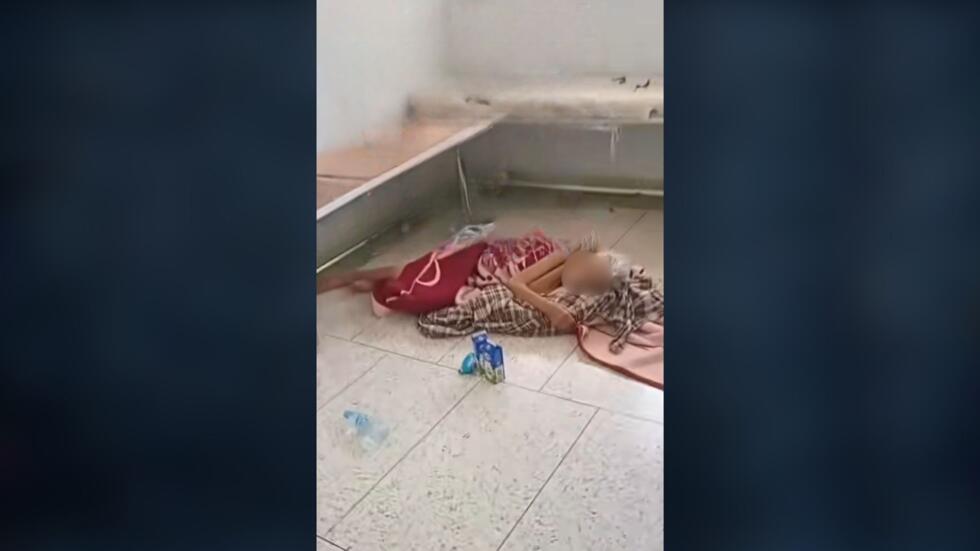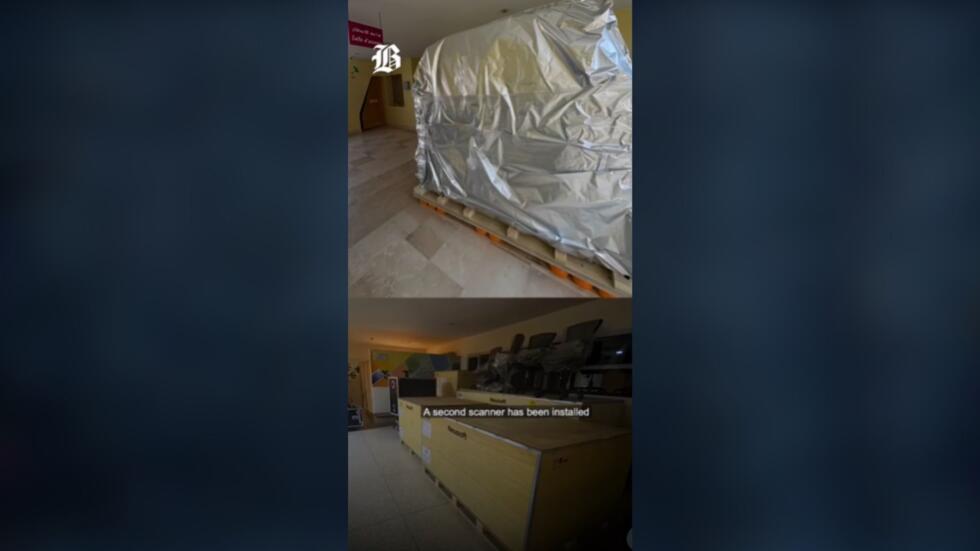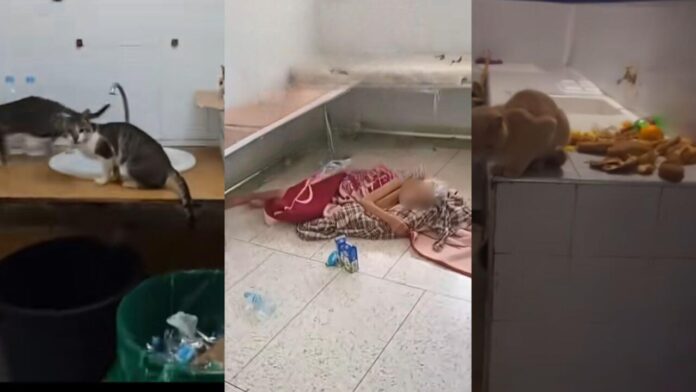“This is Agadir’s hospital! Look at the state of the toilets! It’s disgusting, it’s dirty. Do ill Moroccans deserve this? Are we in a hospital or a barn?”, rants the person who filmed a video showing the state of the toilets in Hassan II Hospital in Agadir, which was published on TikTok on September 16 by the account afriqueactu1. The photos show trash piled on the floor and sink and stray cats wandering down the halls.
These images reflect one of the slogans that has been chanted by protesters in the streets of Morocco since September 14. “We want hospitals, not just stadiums!” cry protesters with the GenZ 212 movement, angry about the money spent by the government in preparation to host the 2025 Africa Cup of Nations and the 2030 World Cup, while their hospitals are in a terrible state.
Among the inciting incidents for the protests were the tragic deaths of eight Moroccan women during Caesarean sections in the space of 10 days in August at Hassan II Hospital in Agadir, which has since been nicknamed the “hospital of death”. These tragedies highlighted a chronic crisis across the kingdom’s public health establishments, whose facilities have been in rapid decline for years.
Another video of the same hospital, posted on September 13, shows more unsanitary scenes, with bits of food and stray cats all over.
“You can see scenes like this all across Morocco, unfortunately there is nothing new here,” writes one commentator. Other images show a man wrapped in blankets curled up on the floor of an empty room, which is also in a sorry state.

Only six to seven percent of the Moroccan government’s budget is allocated for healthcare, according to a report published in 2024 by the National Human Rights Council (CNDH), an independent Moroccan institution responsible for championing human rights in the country. The health spending falls far short of the 15 percent health spending target set in the Abuja Declaration, which African Union members – including Morocco – signed up to in 2001.
Morocco also faces a serious shortage of medical personnel. There are around 2,300 doctors in the public sector, half of whom are operating in either Rabat or Casablanca, even though responding to the needs of the population would require about 32,000 doctors, as well as 65,000 nurses, according to the CNDH report.
‘The state of the hospitals is enough to make you sick’
But the conditions in Agandir’s Hassan II Hospital documented in the recent photos and videos posted online are not an exception. El Mehdi (not his real name) – a medical student who has worked in a number of different public health institutions in Morocco, including Mohammed V Hospital in Safi and the Ibn Rochd University Hospital in Casablanca – says that these poor conditions are ubiquitous in the kingdom’s public hospitals. He says that the entire system is unable to provide the clean and sterile environments needed to treat patients.
El Mehdi says:
“The state of the hospitals is enough to make you sick. Sterilising spaces and equipment has become a huge problem in many health facilities, including the hospital in Safi. There isn’t even an autoclave [Editor’s note: a machine used to sterilise instruments]. My friends and I soak our tools in alcohol or Betadine all night to disinfect them as best as we can.
It’s a lamentable sight, but most Moroccans aren’t aware of what is going on. Most people don’t discover the reality until they end up at the hospital.
There is a shortage of staff and a serious shortage of nearly all materials, including compresses, sutures [surgical thread], and bandages. Sometimes we have to ask patients to buy the items themselves.
Gloves are so rare that we have to wash them, dry them and then re-use them, which goes against everything we’ve learned. A military nurse, who was used to working in well-equipped hospitals, came and did an internship in Safi and was absolutely shocked to discover what it was like and the fact that we have to reuse material.”
‘It’s even worse in the countryside. Some clinics have neither equipment nor doctors’
Yasmine (not her real name), a doctor at the Ibn Rochd University Hospital in Casablanca, told our team:
“Everything is lacking, and the situation is getting worse. I remember when I started, the hospital had more resources than it does now. Sometimes we are forced to ask patients to buy the tubes needed for their own blood samples – items the hospital should provide.”
According to Hajar, a patient in Casablanca, the shortages are even more acute in rural areas:
“It’s even worse in the countryside. Some dispensaries have neither equipment nor doctors. Ambulances transport patients to the city in vehicles that are not properly equipped.”
Corruption and absenteeism
Another key challenge is corruption, which affects all social classes and sectors, particularly education and health. A 2023 national study on corruption conducted by the National Authority for Probity, Prevention, and Fight against Corruption (INPPLC) reveals that 68 percent of Moroccan citizens believe that corruption is widespread – or even very widespread – in the health sector, making it the field they consider the most afflicted by this issue.
El Mehdi told us more:
“Instances of corruption are found primarily among nurses and security staff, and occasionally doctors. They sometimes require people to pay for emergency services, even though these services should be free. Triage is an absolute mess: unless it’s a haemorrhage or a truly critical issue, you have to wait a very long time. Furthermore, nurses will demand cash to push you to the front of the queue, essentially making you pay to avoid waiting for hours.”
In addition to corruption, there is the issue of chronic absenteeism among doctors. Hajar explained:
“Many doctors are paid by the hospital but work part-time in private clinics, and no one really checks up on this. As a result, there’s a lot of absenteeism, especially at night or in the emergency room, where there’s often no doctor present. Surgeons, for instance, are frequently absent because they prefer to operate in the private sector.”
This can have dramatic consequences for patients. El Mehdi said:
“People are dying in hospitals from preventable deaths. Many doctors are going to work at private clinics during their public hospital shifts. A few days ago, someone arrived in the emergency room with a heart attack. They should have been taken to the cardiology unit … but there was no one there. The intensive care couldn’t take them either. They had to go to a private clinic. Seeing their family distraught deeply affected me: we couldn’t do anything, even though a cardiologist should have been present, or at least on call.”
Lack of oversight
These failures – corruption, absenteeism, and embezzlement – are thriving in an environment lacking effective oversight. El Mehdi told our team:
“There isn’t enough control over the staff. Some nurses steal medications for personal use or to resell them, and inspections are very infrequent. Do you remember the mothers who died in Agadir? When the health minister announced he was visiting, the hospital prepared: they received brand-new machines, still in their plastic wrapping. They were never used. They did the same thing at the Safi hospital when they heard the minister was coming. They got new equipment and told us, ‘Don’t touch it,’ then locked it away in a room.”
In an Instagram video posted on September 20 by the Moroccan outlet Barlaman Today, Dr. Ahmed Farissi, a surgeon at Hassan II Hospital in Agadir, shows the still-packaged machines mentioned by our Observer. However, it is not possible to independently verify whether these machines have never been used.

Moroccan Health Minister Amine Tahraoui is facing heavy criticism from the GenZ 212 movement, which is demanding his resignation. The group has primarily criticised Tahraoui for his lack of experience in the healthcare field.
Tahraoui began a tour of Moroccan hospitals after the scandal surrounding the eight women’s deaths during childbirth. The ministry has used social media to publicise these trips, posting a video of the minister’s September 18 visit to the Mohammed V Hospital in Meknes.
‘Many no longer trust public hospitals’
As public hospitals struggle with a critical resource shortage, tensions between healthcare providers and patients are continually rising. For medical staff, these exhausting working conditions are taking a heavy toll on morale and mental health, Yasmine explained:
“It’s extremely draining. We have to manage the daily, fabricated problems that arise from a lack of resources. The university hospital has unmatched experts in almost every specialty, but they aren’t given the tools to do their jobs properly.”
This lack of resources is fuelling patient anger, sometimes escalating to violence, Yasmine said:
“In the admission area of the former emergency department where I worked for two years, the desk and chair were nailed to the floor as a security measure after patients had acted violently toward staff.”
El Mehdi says this aggression is primarily explained by despair:
“Their anger is understandable. Faced with corruption and dysfunctions, people end up frustrated and distrustful. Many no longer trust public hospitals. They go only out of necessity, lacking an alternative, and only believe in a few well-known doctors.”
The Ministry of Health did not reply to a request for comment.
On October 1, Tahraoui presented the main outlines of the national health system reform to Parliament. This wide-ranging plan aims to modernise infrastructure, boost staffing levels and improve governance within the sector.
It calls for the construction of a new university hospital, the addition of more than 3,500 beds, the renovation of 1,400 health centres, and the modernisation of regional hospitals. The reform also includes the creation of new regulatory bodies and the overhaul of several hospital departments deemed to be failing.
This article has been translated from the original in French.
Source link





